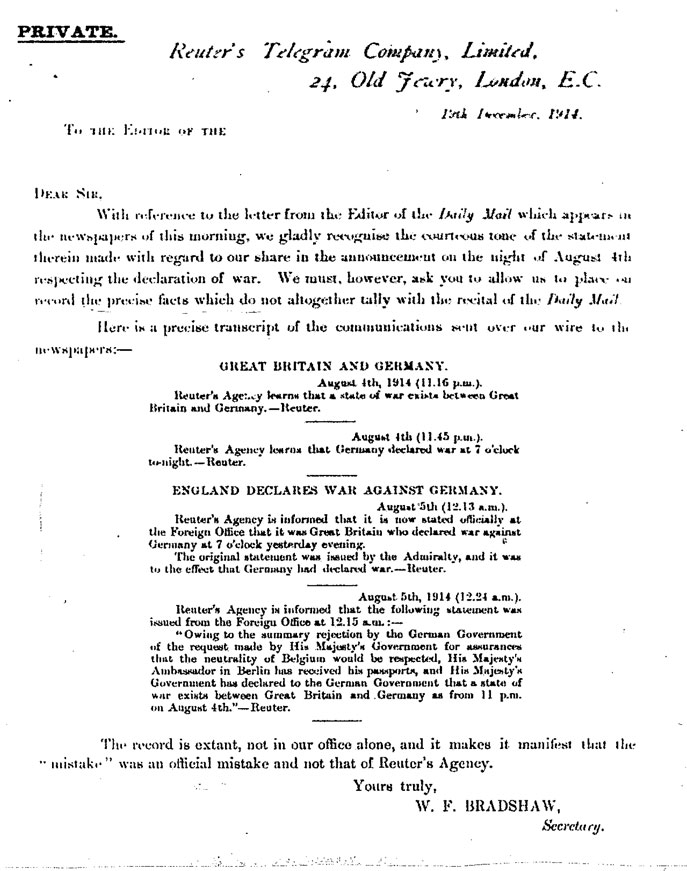Archives
In the First World War, whose side was Reuters on?
Thursday 31 July 2014
 Reuters was the news agency of the British Empire when Great Britain declared war on the German Empire on Tuesday 4 August 1914.
Reuters was the news agency of the British Empire when Great Britain declared war on the German Empire on Tuesday 4 August 1914.
Hostilities had begun one week earlier, on 28 July, when Austria-Hungary declared war on Serbia.
The news that Britain had joined the widening conflict by going to war with Germany had immediate and specific impact.
At a stroke, Reuters lost its revenues from every “enemy” country. Cable and telegraph communications - its life-blood - were disconnected and disrupted. Almost worse was the fact that anti-German hysteria in Britain was becoming ever more strident. Wasn’t Reuter a German name? Even more damning, wasn’t the title held by Baron Herbert de Reuter, its chief, a German one? Reuters never had any reason to make a secret of its 44-year-old news exchange contract with Wolff, the German news agency. Unsurprisingly, some people were only too happy to believe the worst.
In this climate, even a slight ambiguity in the Reuters coverage was likely to arouse suspicion.
By 4 August, hopes of preserving peace between Britain and Germany were fading fast. The British Admiralty intercepted German wireless messages to German shipping warning that war with Britain was imminent. Wrongly, as it turned out, the Admiralty interpreted these signals as meaning that Germany had already declared war. It believed that Germany had anticipated the expiry of the ultimatum received from Britain.
At 11:16 pm, Reuters told its subscribers:
Reuter’s Agency learns that a state of war exists between Great Britain and Germany. - Reuter.
At 11:45 pm, the British Foreign Office put out a statement which Reuters published, in good faith. It reported:
Reuter’s Agency learns that Germany declared war at 7 o’clock to-night. - Reuter.
Almost immediately the Foreign Office realised that it had blundered. Britain was being left to declare war on Germany. Soon after midnight on 5 August, Reuters issued a correction:
Reuter’s Agency is informed that it is now stated officially at the Foreign Office that it was Great Britain who declared war against Germany at 7 o’clock yesterday evening.
The misinformation had come from the Foreign Office. But many were prepared to blame Reuters for confusing the public. A smaller number thought that Reuters had done so deliberately.
anti-German hysteria in Britain was becoming ever more strident. Wasn’t ‘Reuter’ a German name? Even more damning, wasn’t the title held by Baron Herbert de Reuter, its chief, a German one?
At 12:24 am, Reuters said:
Reuter’s Agency is informed that the following statement was issued from the Foreign Office at 12.15 am:-
Owing to the summary rejection by the German Government of the request made by His Majesty’s Government for assurances that the neutrality of Belgium would be respected, His Majesty’s Ambassador in Berlin has received his passports, and His Majesty’s Government has declared to the German Government that a state of war exists between Great Britain and Germany as from 11 pm on August 4th. - Reuter.
Criticism rumbled on for months. Finally it became clear to Reuters that steps would have to be taken. On 19 December, Walter Bradshaw, Reuters company secretary, made the unprecedented decision to write to the agency’s subscribers setting out clearly and precisely how the error had occurred.
Bradshaw’s letter, reproduced above, said:
With reference to the letter from the Editor of the Daily Mail which appears in the newspapers of this morning, we gladly recognise the courteous tone of the statement therein made with regard to our share in the announcement on the night of August 4th respecting the declaration of war. We must, however, ask you to allow us to place on record the precise facts which do not altogether tally with the recital of the Daily Mail.
He then set out the times and "the precise transcript of the communications sent over our wire to the newspapers" and closed with this line:
The record is extant, not in our office alone, and it makes it manifest that the "mistake" was an official mistake and not that of Reuter's Agency.
Reuters’ critics fell silent. ■
- « Previous
- Next »
- 42 of 49